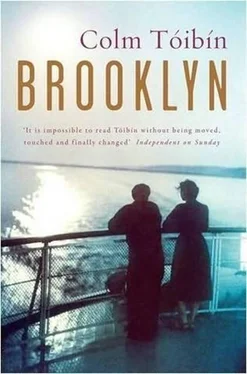"I don't want to interrupt the proceedings," he said, "but we'd like to thank a nice girl from Enniscorthy and two nice women from Arklow for their hard day's work."
There was a round of applause.
"And, as a way of thanking them, there's one great singer in this hall and we're delighted to see him this year again."
He pointed to the man whom Eilis had mistaken for her father. He was sitting away from Eilis and Father Flood, but he stood up when his name was called and walked quietly towards them. He stood with his back to the wall so that everyone could see him.
"That man," Miss Murphy whispered to Eilis, "has made LPs."
When Eilis looked up the man was signalling to her. He wanted her, it seemed, to come and stand with him. It struck her for a second that he might want her to sing so she shook her head, but he kept beckoning and people began to turn and look at her; she felt that she had no choice but to leave her seat and approach him. She could not think why he wanted her. As she came close she saw how bad his teeth were.
He did not greet her or acknowledge her arrival but closed his eyes and reached his hand towards hers and held it. The skin on the palm of his hand was soft. He gripped her hand tightly and began to move it in a faint circular motion as he started to sing. His voice was loud and strong and nasal; the Irish he sang in, she thought, must be Connemara Irish because she remembered one teacher from Galway in the Mercy Convent who had that accent. He pronounced each word carefully and slowly, building up a wildness, a ferocity, in the way he treated the melody. It was only when he came to the chorus, however, that she understood the words-"Má bhíonn tú liom, a stóirín mo chroí"-and he glanced at her proudly, almost possessively, as he sang these lines. All the people in the hall watched him silently. There were five or six verses; he sang the words out with pure innocence and charm so that at times, when he closed his eyes, leaning his large frame against the wall, he did not seem like an old man at all; the strength of his voice and the confidence of his performance had taken over. And then each time he came to the chorus he looked at her, letting the melody become sweeter by slowing down the pace, putting his head down then, managing to suggest even more that he had not merely learned the song but that he meant it. Eilis knew how sorry this man was going to be, and how sorry she would be, when the song had ended, when the last chorus had to be sung and the singer would have to bow to the crowd and go back to his place and give way to another singer as Eilis too went back and sat in her chair.
As the night wore on, some of the men fell asleep or had to be helped to the toilet. The two Miss Murphys made pots of tea and there was Christmas cake. Once the singing ended some of the men found their coats and came up to thank Father Flood and the Miss Murphys and Eilis, wishing them a happy Christmas before setting out into the night.
When most of the men had left and several who remained seemed to be very drunk, Father Flood told Eilis that she could go if she wanted and he would ask the Miss Murphys to accompany her to Mrs. Kehoe's house. Eilis said no, she was used to walking home alone, and it would in any case, she said, be a quiet night. She shook hands with the two Miss Murphys and with Father Flood and wished each of them a happy Christmas before she set out to walk through the dark, empty streets of Brooklyn. She would, she thought, go straight to her room and avoid the kitchen. She wanted to lie on the bed and go over everything that had happened before falling asleep.
In January, Eilis felt the fierce sharp cold in the mornings as she went to work. No matter how fast she walked, and even when she bought thick socks, her feet felt frozen by the time she arrived at Bartocci's. Everyone in the streets was covered up as though afraid to show themselves, wearing thick coats, scarves, hats, gloves and boots. She noticed that they even covered their mouths and noses with thick scarves or mufflers as they moved along. All she could see was their eyes, and the expression seemed alarmed by the cold, made desperate by the wind and the freezing temperatures. At the end of the lectures in the evening, the students huddled in the hallway of the college, putting on layer after layer of clothes as a defence against the cold night. It was, she thought, like a preparation for a strange play, with all of them trying on costumes, their gestures slow and deliberate, looks of blank determination on their faces. It appeared impossible to imagine a time when it was not cold and she could walk these streets thinking about something other than the warm hallway of Mrs. Kehoe's house, the warm kitchen and her own warm bedroom.
One evening, as she was about to go upstairs to bed, Eilis saw Mrs. Kehoe standing in the doorway of her own sitting room, hovering there in the shadows as though afraid to be seen. She beckoned to Eilis without speaking, motioned her into the room and then quietly closed the door. Even as she crossed the room and sat in the armchair by the fire, indicating to Eilis that she should sit in the armchair opposite, she said nothing. The look on her face was grave as she put her right hand out and lowered it, suggesting to Eilis that if she were to speak her voice should not be loud.
"Now," she said and looked into the fire, which was burning brightly in the grate, before placing a log and then another on the flames. "Not a word that you ever even came in here? Promise?"
Eilis nodded.
"The truth is that Miss Keegan is departing and the sooner the better as far as I'm concerned. I have her sworn not to say a word to anyone. She's very West of Ireland and they're better at saying nothing than we are. So it suits her because she doesn't have to say any farewells. She'll be gone on Monday and I want you to move into her room in the basement. It's not damp now so don't look at me like that."
"I'm not looking at you," Eilis said.
"Well, don't."
Mrs. Kehoe studied the fire for a moment and then the floor.
"It's the best room in the house, the biggest, the warmest, the quietest and the best-appointed. And I don't want any discussion about it. You are getting it and that's that. So if you pack your things on Sunday, on Monday when you're at work I'll have them moved down, and that'll be the end of it. You'll need a key for down below because you have your own entrance, which you share with Miss Montini, but of course even if you lose the key, there's still the stairs between the basement and this floor so don't look so worried."
"Will the others not mind that I'm getting the room?" Eilis asked.
"They will," Mrs. Kehoe said and smiled at her. She then looked into the fire, nodding her head in satisfaction. She raised her head and gazed bravely at Eilis. It took Eilis a moment to realize that this was a signal from Mrs. Kehoe that she should leave. She stood up quietly as Mrs. Kehoe once more stretched out her right hand to make clear that Eilis should not make a sound.
It struck Eilis, as she made her way up the stairs to her bedroom, that the basement room could, in fact, be damp and small. She had never heard anyone say before that it was the best room in the house. She wondered if all this secrecy was not merely a way of landing her there without giving her a chance to see where she was going or make any protest. She would have to wait, she realized, until she came back from her classes on Monday night.
Over the next few days she began to dread the move and resent the idea of Mrs. Kehoe moving her cases when she was out of the house and putting them into a place from which Miss Keegan emerged daily in a state that did not seem to Eilis to suggest that she had the best room in the house. She realized also that she could not appeal to Father Flood were the room dingy or dark or damp. She had used up enough of his sympathy and she knew that Mrs. Kehoe was fully aware of this.
Читать дальше












